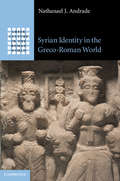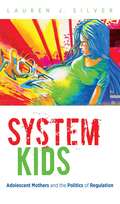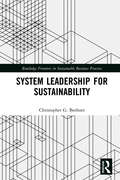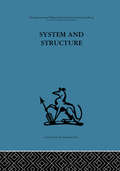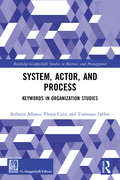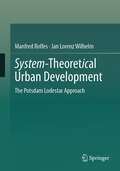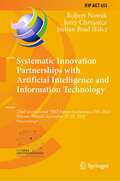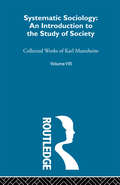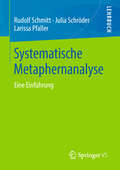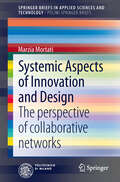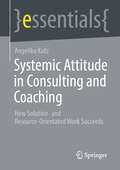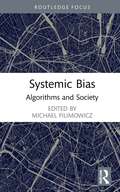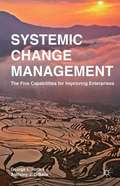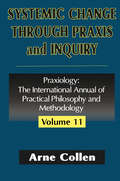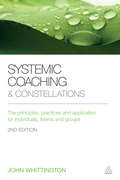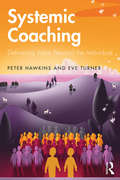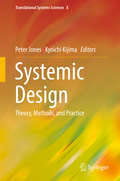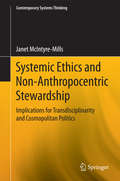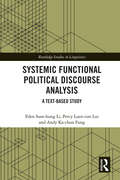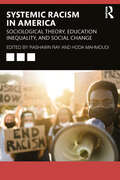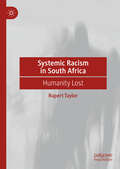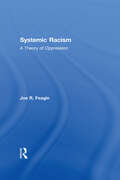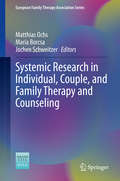- Table View
- List View
Syrian identity in the Greco-Roman world (Greek Culture In The Roman World Ser.)
by Nathanael J. AndradeBy engaging with recent developments in the study of empires, this book examines how inhabitants of Roman imperial Syria reinvented expressions and experiences of Greek, Roman and Syrian identification. It demonstrates how the organization of Greek communities and a peer polity network extending citizenship to ethnic Syrians generated new semiotic frameworks for the performance of Greekness and Syrianness. Within these, Syria's inhabitants reoriented and interwove idioms of diverse cultural origins, including those from the Near East, to express Greek, Roman and Syrian identifications in innovative and complex ways. While exploring a vast array of written and material sources, the book thus posits that Greekness and Syrianness were constantly shifting and transforming categories, and it critiques many assumptions that govern how scholars of antiquity often conceive of Roman imperial Greek identity, ethnicity and culture in the Roman Near East, and processes of 'hybridity' or similar concepts.
System Kids
by Lauren J. SilverSystem Kids considers the daily lives of adolescent mothers as they negotiate the child welfare system to meet the needs of their children and themselves. Often categorized as dependent and delinquent, these young women routinely become wards of the state as they move across the legal and social borders of a fragmented urban bureaucracy. Combining critical policy study and ethnography, and drawing on current scholarship as well as her own experience as a welfare program manager, Lauren Silver demonstrates how social welfare "silos" construct the lives of youth as disconnected, reinforcing unforgiving policies and imposing demands on women the system was intended to help. As clients of a supervised independent living program, they are expected to make the transition into independent adulthood, but Silver finds a vast divide between these expectations and the young women's lived reality.Digging beneath the bureaucratic layers of urban America and bringing to light the daily experiences of young mothers and the caseworkers who assist them, System Kids illuminates the ignored work and personal ingenuity of clients and caseworkers alike. Ultimately reflecting on how her own understanding of the young women has changed in the years since she worked in the same social welfare program that is the focus of the book, Silver emphasizes the importance of empathy in research and in the formation of welfare policies.
System Leadership for Sustainability (Routledge Frontiers in Sustainable Business Practice)
by Christopher G. BeehnerThis book is the first to explore the application of system leadership to promote sustainable solutions for contemporary and future environmental and social problems. The combination of synthesized research summaries and case studies of individuals and organizations contribute considerably to the field by expanding system leadership concepts from theory to practical application. System leadership has been identified as a method by which complex societal problems can be addressed, but it has as yet not been applied to sustainability. The first chapters introduce the background and fundamentals of system leadership and its relevance to sustainability. The chapters that propose methods of developing system leadership, examples of system leaders, and practical application of system leadership in industry, academic, government, nonprofit, and NGO settings. Each chapter includes a chapter case, interview, and/or reflection questions in order to stimulate critical thinking and provide instructional tools for academic use and practical application. The book is particularly relevant to researchers and students internationally in the fields of social development and sustainability. It is also relevant to public, private, and nonprofit/NGO management practitioners who are curious about the leadership styles and skills necessary to develop a sustainable future.
System and Structure: Essays in communication and exchange second edition
by Anthony WildenTavistock Press was established as a co-operative venture between the Tavistock Institute and Routledge & Kegan Paul (RKP) in the 1950s to produce a series of major contributions across the social sciences. This volume is part of a 2001 reissue of a selection of those important works which have since gone out of print, or are difficult to locate. Published by Routledge, 112 volumes in total are being brought together under the name The International Behavioural and Social Sciences Library: Classics from the Tavistock Press. Reproduced here in facsimile, this volume was originally published in 1980 and is available individually. The collection is also available in a number of themed mini-sets of between 5 and 13 volumes, or as a complete collection.
System, Actor, and Process: Keywords in Organization Studies (Routledge-Giappichelli Studies in Business and Management)
by Ylenia Curzi Tommaso Fabbri Roberto AlbanoSystem, Actor and Process: Keywords in Organization Studies is intended as an epistemological ‘compass’ to navigate through the multifaceted key concepts typically used in organizational practice and research. The book illustrates thirty-four keywords using a tripartite structure: each keyword is briefly discussed from three points of view, namely the system-centered, actor-centered and process-centered conception of organization, which reflects the options emerging from contemporary epistemological debate in organizational studies and, more generally, in social sciences, namely objectivism, subjectivism, and the Weberian "third way". Primarily addressed to researchers and academics in organization studies, this book is also a useful resource for undergraduate or postgraduate students, for whom it may represent a thorough introduction to organizational concepts. It will also be a valuable tool for managers to apply in their everyday practice.
System-Theoretical Urban Development: The Potsdam Lodestar Approach
by Manfred Rolfes Jan Lorenz WilhelmIn their book, the authors introduce the topic of urban development from a systems (theoretical) perspective and provide explanatory approaches, tips and methodological instructions for dealing with urban complexity. Knowing full well that this sometimes amounts to squaring the circle, the authors draw on applied systemic approaches and systematically couple these with epistemological currents that can be assigned to Luhmann's systems theory. The social understanding of this theory of social systems represents a very good starting point for understanding urban development and urban complexity. From this perspective, urban development can be seen as a process in which organisations and individuals with their own expectations and perspectives are involved, in which contradictions and conflicts seem inevitable and the future cannot be clearly predicted. Decisions in cities and municipalities are therefore always associated with risks, irritations and unexpected consequences. With the Potsdam lodestar approach, Rolfes and Wilhelm present a multidimensional approach to managing urban development processes. The approach distinguishes five process dimensions, which are presented chapter by chapter and linked with recommendations. The individual chapters are structured along guiding questions and feature appealing visualizations and numerous bonus materials.
System[theoret]ische Stadtentwicklung: Der Potsdamer Leitsternansatz (RaumFragen: Stadt – Region – Landschaft)
by Manfred Rolfes Jan Lorenz WilhelmDie Autoren führen in ihrem Buch aus einer system(theoret)ischen Perspektive in das Themenfeld der Stadtentwicklung ein und liefern Erklärungsansätze, Tipps und methodische Anleitungen zum Umgang mit urbaner Komplexität. Wohlwissend, dass es bisweilen einer Quadratur des Kreises gleichkommt, greifen die Autoren dabei auf anwendungsbezogene systemische Ansätze zurück und koppeln diese systematisch mit erkenntnistheoretischen Strömungen, die der luhmannschen Systemtheorie zugeordnet werden können. Das Gesellschaftsverständnis dieser Theorie sozialer Systeme stellt einen sehr guten Ausgangspunkt für das Verstehen von Stadtentwicklung und urbaner Komplexität dar. Aus dieser Perspektive kann Stadtentwicklung als ein Prozess aufgefasst werden, an dem Organisationen und Personen mit ganz eigenen Erwartungen und Sichtweisen beteiligt sind, bei dem Widersprüche und Konflikte unumgänglich erscheinen und sich Zukunft nicht klar vorhersagen lässt. Entscheidungen in Städten und Gemeinden sind deswegen prinzipiell immer auch mit Risiken, Irritationen und unerwarteten Folgen verbunden. Mit dem Potsdamer Leitsternansatz stellen Rolfes und Wilhelm einen mehrdimensionalen Ansatz zur Steuerung von Stadtentwicklungsprozessen vor. Der Ansatz unterscheidet fünf Prozessdimensionen, die Kapitel für Kapitel vorgestellt und mit Empfehlungen verknüpft werden. Die einzelnen Kapitel strukturieren sich entlang von Leitfragen und verfügen über ansprechende Visualisierungen und zahlreiches Bonusmaterial.
Systematic Innovation Partnerships with Artificial Intelligence and Information Technology: 22nd International TRIZ Future Conference, TFC 2022, Warsaw, Poland, September 27–29, 2022, Proceedings (IFIP Advances in Information and Communication Technology #655)
by Stelian Brad Robert Nowak Jerzy ChrząszczThis book constitutes the refereed proceedings of the 22nd International TRIZ Future Conference on Automated Invention for Smart Industries, TFC 2022, which took place in Warsaw, Poland, in September 2022; the event was sponsored by IFIP WG 5.4.The 39 full papers presented were carefully reviewed and selected from 43 submissions. They are organized in the following thematic sections: New perspectives of TRIZ; AI in systematic innovation; systematic innovations supporting IT and AI; TRIZ applications; TRIZ education and ecosystem.
Systematic Sociology V 8: An Introduction To The Study Of Society (International Library Of Sociology And Social Reconstruction)
by Karl MannheimFirst published in 1957. Routledge is an imprint of Taylor & Francis, an informa company.
Systematische Metaphernanalyse: Eine Einführung
by Rudolf Schmitt Julia Schröder Larissa PfallerDie Analyse von Metaphern hat sich als neuer Weg zu den Deutungen entwickelt, in denen Menschen sich und ihre Welt begreifen. Dieses Lehrbuch führt in den am weitesten entwickelten Metaphernbegriff der kognitiven Linguistik ein und skizziert eine Methode für verlässliche Rekonstruktion der metaphorischen Konstruktionen von Selbst und Welt.
Systemic Aspects of Innovation and Design
by Marzia MortatiThe book provides a snapshot of a hot topic - the systemic nature of innovation and its relevance to design - with a trifold perspective: the academic level - the literature on innovation studies and design is often neglected and a clear connection between the two topics taken for granted; the research level - collaborative models are currently considered great opportunities for transforming consumption, production and distribution of goods, but a clear scholarly discourse is still forming; the political level - the European Commission and the OECD are devoting much effort to understanding and measuring the impact of design in innovation processes and firms and a clear contribution would greatly support this path. Thus the book provides an informed, historical and nuanced perspective to the relationship between design and innovation to contribute to all three levels and to propose a point of view that goes beyond aesthetics and meanings.
Systemic Attitude in Consulting and Coaching: How Solution- and Resource-orientated Work Succeeds (essentials)
by Angelika KutzIn this Springer essentials it is shown that the action portfolio of systemics offers a wonderful basis to support clients - or a client system - in the best possible way to initiate and shape change processes (change) and to work out suitable solutions for the client system. The systemic attitude can also be learned, is a healing companion in all life situations and represents a continuous maturing process.
Systemic Bias: Algorithms and Society (Algorithms and Society)
by Michael FilimowiczSystemic Bias: Algorithms and Society looks at issues of computational bias in the contexts of cultural works, metaphors of magic and mathematics in tech culture, and workplace psychometrics. The output of computational models is directly tied not only to their inputs but to the relationships and assumptions embedded in their model design, many of which are of a social and cultural, rather than physical and mathematical, nature. How do human biases make their way into these data models, and what new strategies have been proposed to overcome bias in computed products? Scholars and students from many backgrounds, as well as policy makers, journalists, and the general reading public will find a multidisciplinary approach to inquiry into algorithmic bias encompassing research from Communication, Art, and New Media.
Systemic Change Management
by George L. Roth Anthony J. DibellaAchieving and sustaining great business performance requires more than ongoing internal improvements; it demands a capacity to promote changes across organizations that depend on one another. Through a series of cases, Systemic Change Management describes a systems approach to enterprise change. Organizations are more successful individually and collectively when they develop and diffuse five enterprise change capabilities - promoting enterprise awareness, installing innovation sets, balancing push and pull changes, seeking growth, and distributing leadership. Each capability enhances individual firm performance and when used together create a synergy that magnifies their overall effectiveness and impact. This book explains how a system of change capabilities can be developed and demonstrates their use at a variety of organizations, including United Technologies, Rockwell Collins, Raytheon, Toyota, Ariens, the US Army, and US Air Force. The reader will come to understand that performance improvement requires internal change along with collaboration with suppliers and other organizations to effectively function as an enterprise.
Systemic Change Through Praxis and Inquiry
by Arne CollenThis new volume in the distinguished Praxiology series examines the confluence of praxiology, pragmatics, and systemics in the study of systemic change through human inquiry, particularly small group activities, human organizations, and globalizing trends. It covers core concepts indigenous to organizational life. The author presents and subsequently integrates several conceptual schemes relevant to human beings and small groups engaged in human inquiry for systemic change in organizational settings.Each key concept in the volume is covered in a chapter theme that articulates the praxiology and pragmatics of human inquiry. Chapter 1 examines change as a systemic idea from a research methodologist's point of view. Chapter 2 articulates numerous points to distinguish systemic from non-systemic research methods to bring about systemic change. Chapter 3 discusses the prevalence of hierarchy and control. Chapter 4 focuses on "disciplinarity," viewed as one kind of quest for understanding complexity and change. Chapter 5 describes praxiology in inquiry. Chapter 6 elaborates on emergent forms of praxiology. Chapter 7 demonstrates the viability of systemic change through praxiology. Chapter 8 targets the general features of research process that are the means to effectuate systemic change, while Chapter 9 elaborates on these means toward developing systemic inquiry to systemic change. Chapter 10 discusses "complexification" in human inquiry and systemic change.Systemic Change Through Praxis and Inquiry is a pioneering effort to attain a more integrated view of research methodology for human inquiry. It will be of great interest to students of business, management, and organizational studies.Arne Collen is a long-standing member of both the Executive Faculty at Saybrook Graduate School in San Francisco and the Research and Teaching Adjunct Faculty in the California College of Organizational Studies and the California College of Professional Psychology of Alliant International University, San Francisco Bay Campus. He is a research methodologist, who, over the last three decades, has applied systemic and sociocybernetic perspectives to advances in research methodology for human inquiry. With Wojciech W. Gasparski, he is co-editor of Design and Systems, Volume 3 of the Praxiology series.
Systemic Coaching and Constellations
by John WhittingtonSystemic Coaching and Constellations offers a refreshingly uncomplicated path into a potentially complex subject, demonstrating how this approach can provide access to systems and deliver enduring benefits for coaching clients. This new edition offers a comprehensive introduction to the principles that sustain systems, real world descriptions of what systemic coaching is and how it can be useful as well as a step-by-step guide to integrating the principles and practices into coaching. Highly practical, Systemic Coaching and Constellations includes a wide range of exercises for application with individuals and teams. It also includes a brand new chapter on Belonging, fully updated case studies from coaches who have taken part in John's trainings, a joint ICF/EMCC constellation workshop and examples from coaches around the world, including Australia, Mexico, France, Spain, US and the Netherlands. Whether used in an initial selection meeting or to underpin all your coaching conversations and interventions, Systemic Coaching and Constellations offers an accessible, practical starting point to transform your coaching practice.
Systemic Coaching: Delivering Value Beyond the Individual
by Peter Hawkins Eve TurnerHawkins and Turner argue that coaching needs to step up to deliver value to all the stakeholders of the coachee, including those they lead, colleagues, investors, customers, partners, their local community and also the wider ecology. Systemic Coaching contains key chapters on how to contract in various settings, how to work relationally and dialogically, how to expand our own and others’ ecological awareness, how to get greater value from supervision, work with systemic ethics and expand our impact. While illustating why a new model of coaching is necessary, Hawkins and Turner also provide the tools and approaches that coaches and clients need to deliver this greater impact, accompanied by real-life case examples and interviews from the authors and other leading coaches and leaders globally. Systemic Coaching will be an invaluable resource for coaches in practice and in training, mentors, coach supervisors, consultants in leadership development and HR and L&D professionals and leaders.
Systemic Cognition and Education: Empowering Students for Excellence in Life
by Ibrahim A. HallounThis book offers pedagogic and governance foundations and guidelines for systemic education. It provides an overall systems-based picture of what formal education should be about, and of how things should be carried out in practice, in order to empower students – and teachers – for success in life. It transcends traditional disciplinary education, showing how systemic, praxis immersive, convergence education (SPICE) produces graduates who know how to think outside the box and excel in practical real-life situations. Drawing on philosophy, cognition, and the latest developments in neuroscience, the book calls for systemic pedagogical frameworks that allow for different curricula to be coherently and efficiently designed, and consistently and systematically deployed across different disciplines and various grade levels in the context of mind-and-brain based experiential learning ecologies.This volume is a major design and practice reference for school teachers, university professors, graduate students, along with interested educators, educationists, and stakeholders in various sectors of society.
Systemic Design: Theory, Methods, and Practice (Translational Systems Sciences #8)
by Peter Jones Kyoichi KijimaThis book presents emerging work in the co-evolving fields of design-led systemics, referred to as systemic design to distinguish it from the engineering and hard science epistemologies of system design or systems engineering. There are significant societal forces and organizational demands impelling the requirement for “better means of change” through integrated design practices of systems and services. Here we call on advanced design to lead programs of strategic scale and higher complexity (e.g., social policy, healthcare, education, urbanization) while adapting systems thinking methods, creatively pushing the boundaries beyond the popular modes of systems dynamics and soft systems. Systemic design is distinguished by its scale, social complexity and integration – it is concerned with higher-order systems that that entail multiple subsystems. By integrating systems thinking and its methods, systemic design brings human-centred design to complex, multi-stakeholder service systems. As designers engage with ever more complex problem areas, it is necessary to draw on a basis other than individual creativity and contemporary “design thinking” methods. Systems theories can co-evolve with a new school of design theory to resolve informed action on today’s highly resilient complex problems and can deal effectively with demanding, contested and high-stakes challenges.
Systemic Ethics and Non-Anthropocentric Stewardship
by Janet Mcintyre-MillsThis book makes a case for rights and responsibilities to be expressed through a cosmopolitan praxis based on developing strong cosmopolitan approaches. This developed approach respects a form of cultural or national identity that is not at the expense of others, the environment or future generations. This new stoicism is based on a sense of responsibility for others. The book also explores systemic ethical praxis in response to the vexed challenge of how to bridge the false dualism of pitting the environment versus profit Systemic Ethics and Non-Anthropocentric Stewardship: Implications for Transdisciplinarity and Cosmopolitan Politics is organized into seven chapters. The book begins by providing readers with an understanding of the way in which cosmopolitanism (like all social concepts) is shaped by diverse definitions and applied differently by theorists and those that engage in transformative praxis. It also develops an argument based on considering the empirical consequences of social, economic and environmental decisions on the quality of life of current and future generations. The next chapter critiques anthropocentricism and explores how policy makers develop agreements on what constitutes and supports the wellbeing of the planet rather than the GDP. The book then explores the options for social democracy and ways to enhance an ethical approach to post national governance and argues for participatory democracy and governance to respond to diversity within and across national boundaries. The following chapters reflect upon the author's own participatory action research process and examines the transformations that can arise through critical systemic thinking and practice. Next the book makes the case for systemic ethical governance that is able to manage consumption, before concluding with a final look at the book's approach, based on critical heuristics.
Systemic Functional Political Discourse Analysis: A Text-based Study (Routledge Studies in Linguistics)
by Eden Sum-hung Li Percy Luen-tim Lui Andy Ka-chun FungSystemic Functional Political Discourse Analysis: A Text-based Study is the first book which takes a comprehensive systemic functional perspective on political discourse to provide a complete, integrated, exhaustive, systemic and functional description and analysis. Based on the political discourses of the Umbrella Movement – the largest public protest in the history of Hong Kong, which occupies a unique political situation in the world: a post-colonial society like many other Asian societies and yet unlike the others, it is a Special Administrative Region of China. Though it enjoys a high degree of autonomy under the principle of ‘One Country, Two Systems’, it is still confined to being part of the ‘One Country’. The book demonstrates how a systemic functional approach can provide a comprehensive, thorough, and insightful analysis of the political discourse from four co-related and complementary approaches: contextual, discourse semantic, lexicogrammatical and historical. Apart from a thorough discussion of various systemic functional conceptions, it provides examples of various analyses from a SF perspective, including contextual parameters, registerial analysis, semantic discourse analysis, appraisal analysis, and discusses important issues in political discourse, including negotiation of self-identity, association of language, power and institutional role, and expression of ‘evidentiality’ and ‘subjectivity’. It is written not only for those who are interested in Hong Kong politics in general and political discourse in Hong Kong in particular, but also for those who work on political discourse analysis, and those who apply SFL to various other discourses such as mass media discourse, medical discourse, teaching discourse, etc. Last but not least, this book is also intended to provide a theoretical framework in discourse analysis from the systemic functional perspective for those who work in Cantonese and in other languages.
Systemic Racism in America: Sociological Theory, Education Inequality, and Social Change
by Rashawn RayRacist policies are identified as "opportunity killers," and the disparities created by them often have racism sustained through race-neutral policies. Systemic Racism in America: Sociological Theory, Education Inequality, and Social Change situates our contemporary moment within a historical framework and works to identify forms, occurrences, and consequences of racism as well as argue for concrete solutions to address it. This volume assembles renowned and thought-provoking social scientists to address the destructive impacts of structural racism and the recent, incendiary incidents that have driven racial injustice and racial inequality to the fore of public discussion and debate. The book is organized into three parts to explore and explain the ways in which racism persists, permeates, and operates within our society. The first part presents theoretical perspectives to analyze the roots and manifestation of contemporary racism; the second concentrates on educational inequality and structural issues within our institutions of learning that have led to stark racial disparities; and the third and final section focuses on solutions to our current state and how people, regardless of their race, can advocate for racial equity. Urgent and needed, Systemic Racism in America is valuable reading for students and scholars in the social sciences, as well as informed readers with an interest in racism and racial inequality and a passion to end it.
Systemic Racism in South Africa: Humanity Lost
by Rupert TaylorThis book takes a critical macro-level political sociological perspective to understanding South African politics and society. Applying systemic racism theory to South Africa, the author argues that South African society through its exclusionary social mechanisms has assumed a systemically racist form that deeply compromises questions of truth and justice. Constitutive of, and embedded in, the structure of South African society, racism has a reach and a durability that runs deep through the successive stages of segregationism, apartheid, and liberal democracy. Showing the limits of the rule of law in a racist society, the author offers a theoretically-informed interpretation as to why the national liberation struggle has fallen short of its promise to deliver a &“better life for all,&” and as to why truth and justice remain so deeply compromised in South Africa today. The arguments advanced are supported by over thirty semi-structured interviews conducted by the author with high-profile South African politicians, jurists, and intellectuals; as well as by using Truth and Reconciliation Commission hearing transcripts – both public and &“top-secret.&” This thought-provoking book is driven by the imperative to offer a compelling and sustained argument for taking a systemic racism approach to interpreting South Africa for scholars and students of sociology, political science, race and ethnic studies, law, and South African history.
Systemic Racism: A Theory of Oppression
by Joe FeaginIn this book, Feagin develops a theory of systemic racism to interpret the highly racialized character and development of this society. Exploring the distinctive social worlds that have been created by racial oppression over nearly four centuries and what this has meant for the people of the United States, focusing his analysis on white-on-black oppression. Drawing on the commentaries of black and white Americans in three historical eras; the slavery era, the legal segregation era, and then those of white Americans. Feagin examines how major institutions have been thoroughly pervaded by racial stereotypes, ideas, images, emotions, and practices. He theorizes that this system of racial oppression was not an accident of history, but was created intentionally by white Americans. While significant changes have occurred in this racist system over the centuries, key and fundamentally elements have been reproduced over nearly four centuries, and US institutions today imbed the racialized hierarchy created in the 17th century. Today, as in the past, racial oppression is not just a surface-level feature of society, but rather it pervades, permeates, and interconnects all major social groups, networks, and institutions across society.
Systemic Research in Individual, Couple, and Family Therapy and Counseling (European Family Therapy Association Series)
by Maria Borcsa Jochen Schweitzer Matthias OchsThis book examines systemic family therapy research, addressing key topics across the interrelated disciplines of psychotherapy, social work, and counseling. Drawing from contributions at the 2017 International Systemic Research Conference in Heidelberg, it includes both quantitative and qualitative research perspectives and outlines a wide array of approaches, using systems theory and constructivist epistemology. In addition, the book focuses on innovative paradigms, research strategies, and methods, seeking to bridge the gap between research and practice in the field of systemic family therapy. Finally, it provides guidance on submitting and maximizing the likelihood of research paper acceptance to leading family therapy journals. Topics featured in this book include:Effectiveness of research-informed systemic therapy.Mindfulness and compassion-based interventions in relational contexts.Use of SCORE (Systemic Clinical Outcome and Routine Evaluation) as an indicator of family functioning in Europe.Systemic approaches for working with couples with high conflict behaviors.Therapeutic-Factor-Oriented skill building in systemic counseling.Importance of client feedback in development of professional knowledge base. Systemic Research in Individual, Couple, and Family Therapy and Counseling is a must-have resource for researchers, professors, and graduate students in family therapy, clinical psychology, general practice/family medicine, and social work as well as all interrelated psychology and medical disciplines.
